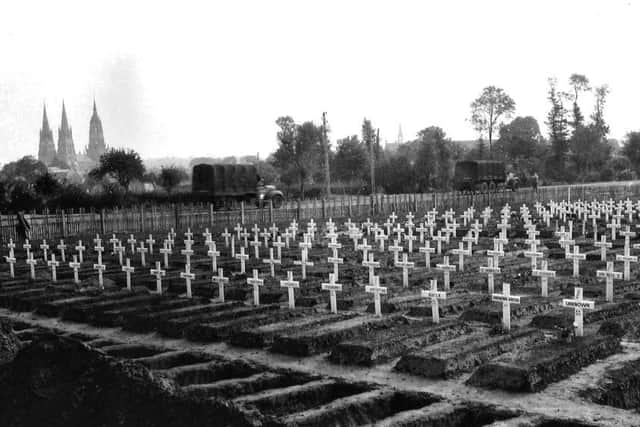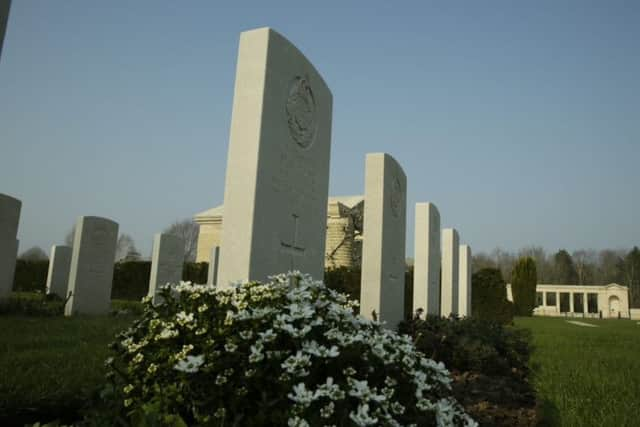D-Day’s story of courage and the fight for freedom – Jayne Dowle
Just think how it would be if the 10,000 or so men who never came back were erased from our collective consciousness, or if we couldn’t watch news reports, documentaries and films which relive the sheer visceral horror of the terrible odds against survival on the beaches, and in the fields, of Northern France.
Advertisement
Hide AdAdvertisement
Hide AdWhat if we couldn’t read and hear stories from veterans such as Ted Cordery, who was a 20-year-old torpedo man on HMS Belfast, standing helplessly on deck as countless men drowned in the water beneath him? Now 95, he reflected: “It’s like everything, you go into something strange and of course you’re apprehensive, even if you’re not frightened, because you just get on with it – and please God you’ll be alright.”


Please God you’ll be alright. No vainglorious rhetoric here. Just simple words. Even the youngest of the few hundred veterans still alive are now in their 90s. The startling fact is that they represent the youngest soldiers, sailors and airmen to take part – and therefore the most vulnerable, inexperienced and frightened in the eve of battle.
This makes their stories especially poignant. The NCOs, the officers, the generals and commanders have mostly gone before them now; our very last living memory of D-Day will be that of a young man on the brink of adulthood wondering if he would see tomorrow.
Advertisement
Hide AdAdvertisement
Hide AdIn our family, that young man never saw his own tomorrow. My children’s great uncle Arthur was killed near Caen at the age of 21. A member of the Reconnaissance Corps, he landed shortly after D-Day itself and fought his way through summer cornfields to the Falaise Gap.


He is buried in a military ceremony near Arromanches, where the rotting hulks of the bridges built in the sea as part of the landing operations stand sentinel to remind visitors to the pretty seaside town of what once happened here.
Arromanches is also the location of the D-Day Museum, located on the site of one of two artificial harbours created by the Allied forces to facilitate the landings. It is not until you stand and look out across the Channel from this point that you begin to truly appreciate the colossal scale of the undertaking.
Just 23 years marks the time passing between D-Day and my own birth in 1967. However, until recently, I think my generation has always struggled to grasp exactly what this landmark event meant. We didn’t even study it in history lessons at school.
Advertisement
Hide AdAdvertisement
Hide AdIn addition, when the Second World War was over, the speed of social change was so rapid that it seemed to belong to an entirely different era. People, especially in coal communities such as mine, didn’t discuss it. Very few of my own family members were involved in front-line fighting; they were all underground, digging out coal to keep the armaments factories churning and the battleships going.
And who wanted to talk about the war when we had so much to look forward to? Some of us grew up as pacifists, or found the idea of commemoration too militaristic and atavistic.
And then, in no small part thanks to the steady stream of films – notably Saving Private Ryan in 1998, which chronicled events from the American point of view – and documentaries which began to explore individual stories, attitudes began to shift. Now it’s as if we’re desperate to know how it felt to be part of something so much bigger than ourselves.
In our own troubled times, are we looking for context? Has the experience of separating ourselves from Europe made us consider how hard our grandparents and great-grandparents fought to liberate it from extremism? Or are we searching for ways to still be proud of Great Britain?
Advertisement
Hide AdAdvertisement
Hide AdTwo weeks ago, I visited Chartwell in Kent, the home of Winston Churchill. On a showery Sunday afternoon, the place was packed with visitors. And they weren’t all there to visit the National Trust tea-room.
Listening to the conversations as we moved around the homely rooms where Churchill took calls from Eisenhower and drafted orders which steered the course to eventual victory, the prevailing mood was one of curiosity and eagerness to learn.
And through film, sound recordings and impressive displays of contemporary newspaper reports we did; the stories on the walls told of a great man, a world-famous politician and an exemplary leader. And they proved why media is so important, and why we shouldn’t take for granted the freedom of information we enjoy.
At this time of national reminiscence, above all, remember that.